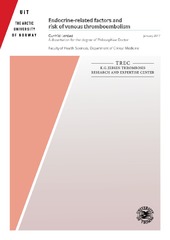| dc.contributor.advisor | Hansen, John-Bjarne | |
| dc.contributor.author | Lerstad, Gunhild | |
| dc.date.accessioned | 2017-07-13T12:35:08Z | |
| dc.date.available | 2017-07-13T12:35:08Z | |
| dc.date.issued | 2017-05-31 | |
| dc.description.abstract | Even though many environmental and inherited predisposing factors have been associated
with venous thromboembolism (VTE), still 30–50% of the events have no obvious provoking
factors. There is limited knowledge concerning the association between endocrine-related
factors and VTE risk. Therefore we aimed to investigate the relation between hyperglycemia,
thyroid function, vitamin D, calcium, parathyroid hormone (PTH), and risk of future VTE in a
general population.
Our study participants were recruited from the Tromsø study (Tromsø 4; 1994-95,
Tromsø 5; 2001-2, and/or Tromsø 6; 2007-8). Two of the papers are based on all three
surveys, one paper is based on the fourth and fifth, and one on the fourth survey only. The
fourth survey is the largest one, and a total of 27 158 men and women attended. A subset of
participants (n=9 056) were further invited to a more extensive second visit. In Tromsø 5 and
6 only subgroups of the municipality of Tromsø were invited. The overall attendance rate
went from 77% in Tromsø 4 to 66% in Tromsø 6. Incident VTE events were registered from
the date of inclusion until the end of follow-up.
Our findings suggest that hyperglycemia does not play an important role in the
pathogenesis of VTE, and that obesity is a more important contributor to VTE in subjects with
hyperglycemia. TSH within the normal range were not associated with risk of VTE, whereas
low and high TSH were associated with a moderately increased risk of VTE. However, the
prevalence and the population attributable risk of thyroid dysfunction was low, suggesting
that only a minor proportion of the VTE events in the population can be attributed to thyroid
dysfunction. Vitamin D status was not associated with VTE risk. Finally, calcium and PTH
alone were not associated with future risk of VTE. However, high levels of both calcium and
PTH were associated with increased risk of VTE compared to subjects with normal calcium
and PTH. | en_US |
| dc.description.abstract | Venøs tromboembolisme (VTE) er et samlebegrep for lungeemboli og dyp venetrombose. Selv om man har identifisert flere ervervede og arvelige risikofaktorer for VTE, oppstår likevel 30-50% av VTE-hendelsene uten kjent årsak. Lite er kjent om sammenhengen mellom endokrin-relaterte faktorer og risiko for VTE. Formålet med denne avhandlingen var derfor å undersøke sammenhengen mellom forhøyet blodsukker, stoffskiftet, vitamin D, kalsium og parathyroideahormon (PTH), og risiko for VTE i en generell befolkning. Studiepopulasjonen vår ble rekruttert fra Tromsø-undersøkelsen (Tromsø 4; 1994-95, Tromsø 5; 2001-2, og/eller Tromsø 6; 2007-8). To av artiklene er basert på alle tre undersøkelsene, én artikkel er basert på den femte og sjette, og én er kun basert på den fjerde undersøkelsen. Førstegangs VTE-hendelser ble registrert fra inklusjonsdato i Tromsøundersøkelsen og ut oppfølgingstiden som ble avsluttet ved utgangen av 2012. Våre funn tyder på at høyt blodsukker ikke spiller en viktig rolle i sykdomsutviklingen av VTE, men at fedme er en vesentlig bidragsyter for VTE hos personer med forhøyet blodsukker. Serumnivå av thyroidea stimulerende hormon (TSH) innenfor normalområdet var ikke assosiert med risiko for VTE, men ekstremt lave og høye verdier av TSH var assosiert med en moderat forhøyet risiko for VTE. Da forekomsten (og dermed den tilskrivbare risikoen) av forstyrrelser i stoffskiftet er lav i befolkningen, tilsier det at bare en svært liten del av risikoen for VTE i befolkningen skyldes forstyrrelser i stoffskiftet. Nivået av vitamin D i blodet er i hovedsak bestemt av tilskudd i kosten og av soleksponering. I vår studie var hverken ekstreme verdier eller variasjoner i normalområdet for vitamin D assosiert med risiko for VTE. PTH er et hormon som spiller en sentral rolle i reguleringen av kalsium-innholdet i blodet. Vi fant at hverken kalsium eller PTH var assosiert med risiko for VTE, mens høye verdier av kalsium kombinert med høye verdier av PTH økte risikoen for VTE med 78% sammenlignet med normale nivåer av begge. Hovedkonklusjonen i avhandlingen er at endokrin-relaterte faktorer i liten grad er assosiert med risiko for VTE, men forstyrrelser i stoffskiftet, og samtidig høye verdier av PTH og kalsium i blodet, er assosiert med moderat økt risiko for VTE. | en_US |
| dc.description.doctoraltype | ph.d. | en_US |
| dc.description.popularabstract | There is limited knowledge concerning the association between levels of blood sugar, thyroid stimulating hormone (TSH), vitamin D, calcium, parathyroid hormone (PTH) and risk of venous thromboembolism (VTE). The present thesis investigates these associations in cohorts with participants from the Tromsø study. Impaired glucose metabolism was not associated with future risk of VTE. High and low levels of TSH, an important regulator of metabolism, were associated with a moderately increased VTE risk. Vitamin D levels were not associated with VTE risk. PTH is a key hormone in the regulation of calcium in the blood. We found that neither calcium nor PTH were associated with risk of VTE. However, both high calcium and PTH levels increased the risk of VTE by 78% compared to normal levels. Our findings add further insight into the association between hormone-related factors and VTE, but more studies are still needed. | en_US |
| dc.description | The papers II, III and IV of this thesis are not available in Munin. <br>
<br>
Paper II: Lerstad, G., Enga, K. F., Jorde, R., Brodin, E. E., Svartberg, J., Brækkan, S. K., Hansen, J-B.: “Thyroid function, as assessed by TSH, and future risk of venous thromboembolism: the Tromsø study”. Available in <a href=http://dx.doi.org/10.1530/EJE-15-0185> Eur J Endocrinol 2015, 173:83-90. </a>
<br>
Paper III: Brodin, E., Lerstad, G., Grimnes, G., Brækkan, S. K., Vik, A., Brox, J., Svartberg, J., Jorde,
R., Hansen, J-B.: “Serum levels of vitamin D are not associated with future risk of venous
thromboembolism. The Tromsø Study”. Available in <a href=http://doi.org/10.1160/TH12-10-0728> Thromb Haemost. 2013 May;109(5):885-90. </a>
<br>
Paper IV: Lerstad, G., Brodin, E., Svartberg, J., Jorde, R., Brox, J., Brækkan, S. K.,
Hansen, J-B.: “Associations between serum levels of calcium, parathyroid hormone and future
risk of venous thromboembolism -The Tromsø study”. (Manuscript). | en_US |
| dc.identifier.uri | https://hdl.handle.net/10037/11252 | |
| dc.language.iso | eng | en_US |
| dc.publisher | UiT The Arctic University of Norway | en_US |
| dc.publisher | UiT Norges arktiske universitet | en_US |
| dc.rights.accessRights | openAccess | en_US |
| dc.rights.holder | Copyright 2017 The Author(s) | |
| dc.subject.courseID | DOKTOR-003 | |
| dc.subject | VDP::Medisinske Fag: 700::Klinisk medisinske fag: 750::Hematologi: 775 | en_US |
| dc.subject | VDP::Medical disciplines: 700::Clinical medical disciplines: 750::Hematology: 775 | en_US |
| dc.subject | The Tromsø Study | |
| dc.subject | Tromsøundersøkelsen | |
| dc.title | Endocrine-related factors and risk of venous thromboembolism | en_US |
| dc.type | Doctoral thesis | en_US |
| dc.type | Doktorgradsavhandling | en_US |


 English
English norsk
norsk
